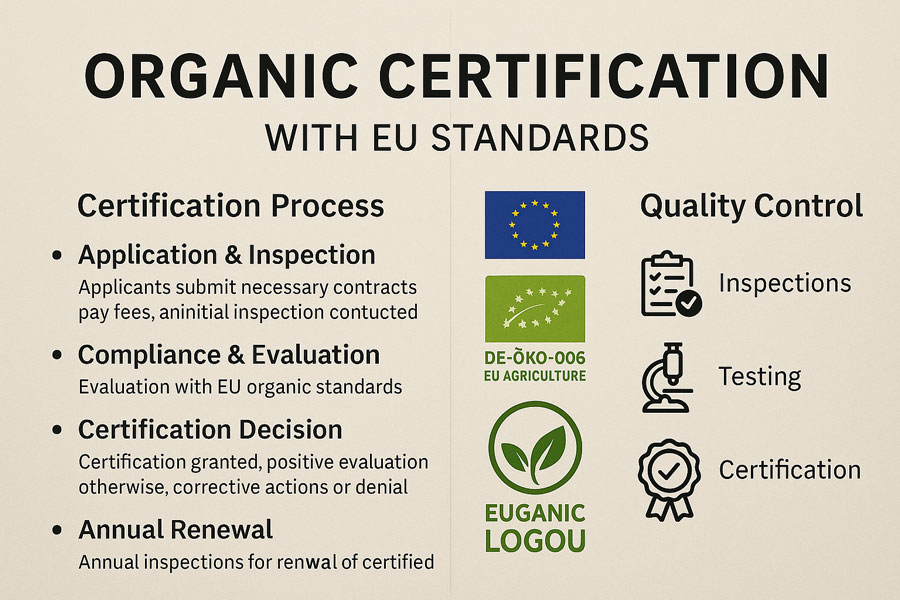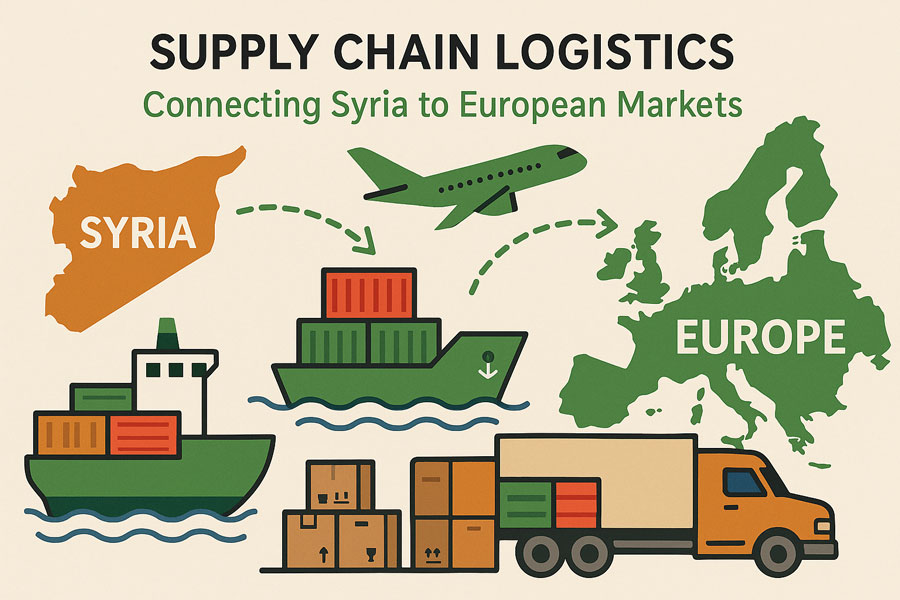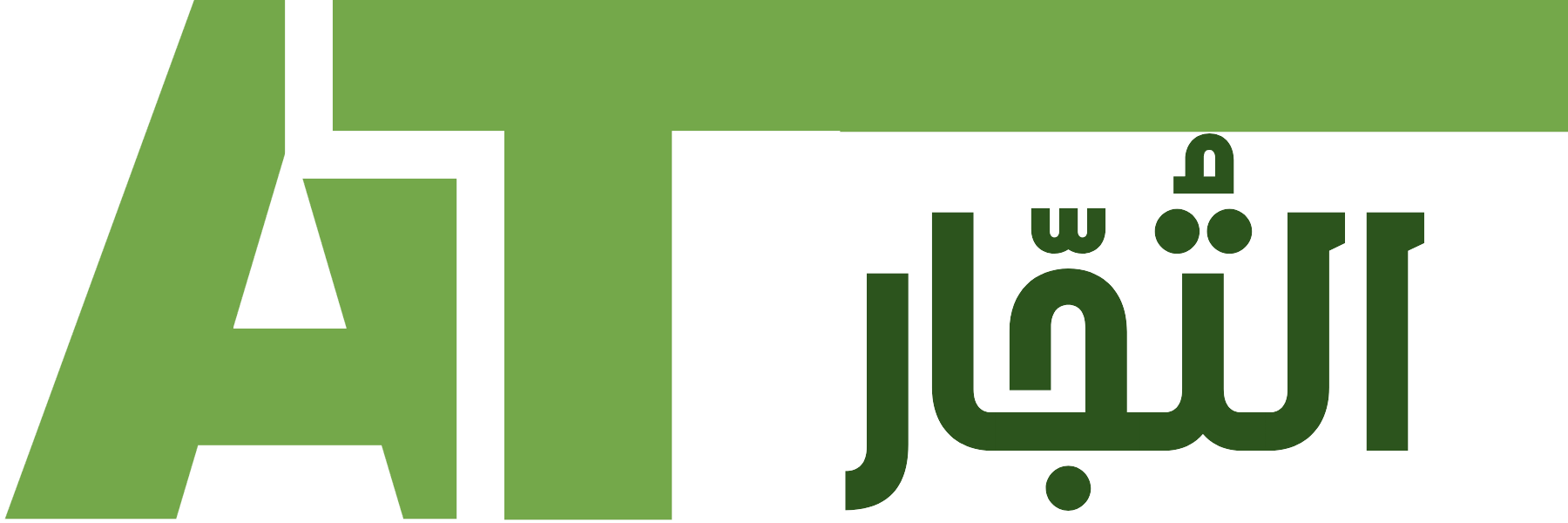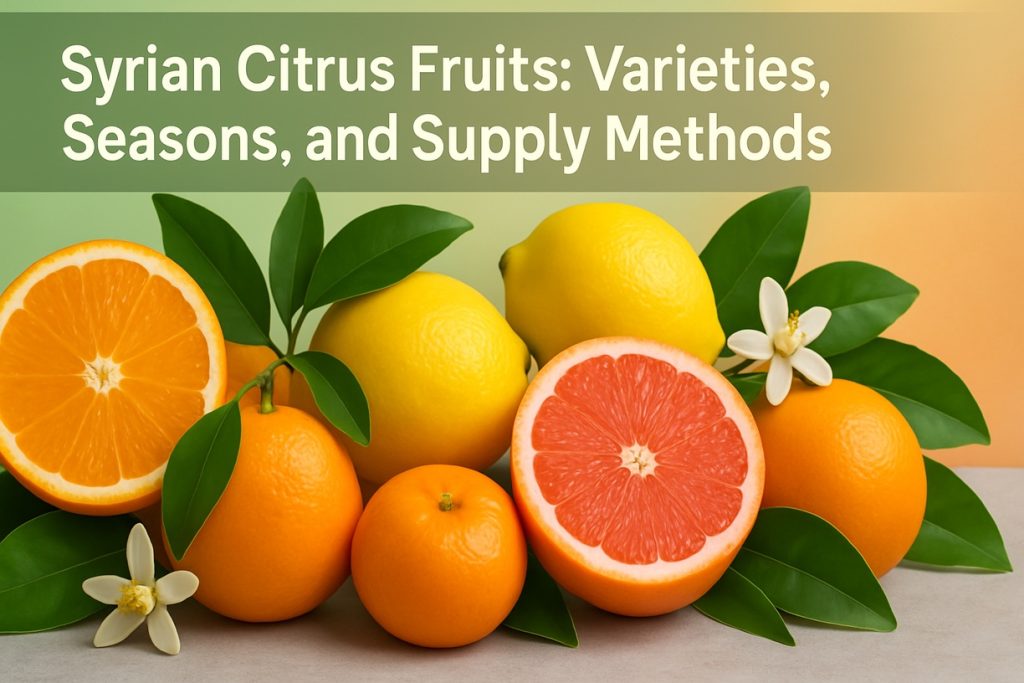Demand for Organic: Identifying High-Potential Organic Product Markets in Europe
The European Union stands as the world's second-largest organic market, presenting significant opportunities for organic producers. Despite recent inflationary pressures, the market demonstrates resilience and continued growth potential. Key markets within Europe exhibiting high demand for organic products include Germany, France, and Italy. These countries lead in retail sales of organic agricultural products, with expanding retail channels, including supermarkets and specialty stores, enhancing accessibility for consumers.
Syrian organic producers can tap into this growing demand by focusing on these high-potential markets. The EU's commitment to increasing organically farmed land to 25% by 2030 further underscores the long-term viability and growth trajectory of the organic sector. This policy push, coupled with evolving consumer preferences for sustainable and healthy food options, creates a fertile ground for new entrants.
Key Takeaways for Syrian Producers:
- Target Leading Markets: Prioritize Germany, France, and Italy due to their established high retail sales and expanding distribution networks for organic products.
- Understand Consumer Trends: European consumers are increasingly seeking ethically produced, sustainably sourced, and high-quality organic products. Highlighting these aspects of Syrian produce can be a significant differentiator.
- Long-Term Growth: The EU's strategic focus on organic farming signals sustained growth and policy support, ensuring a stable and expanding market for organic goods.
Certification Requirements: Navigating EU Organic Standards and Certifications

To successfully enter the European organic market, Syrian producers must adhere to stringent EU organic standards. The EU organic farming rules cover agricultural products, including aquaculture and yeast, and encompass every stage of the production process. Products must be certified by an authorized control agency or body to use the official EU organic logo and be labeled as 'organic'.
Key Certification Requirements:
- EU Organic Logo: Only products certified as organic by an approved body can display the green EU organic logo.
- Composition: To receive EU Organic Certification, a product must contain at least 95% organic agricultural ingredients. The remaining 5% must meet strict criteria.
- Electronic Certificates of Inspection (COI): For imports of organic products into the EU, an electronic Certificate of Inspection (COI) is required under Regulation 2021/2306. This ensures traceability and compliance.
- Accredited Certification Bodies: Syrian producers will need to work with certification bodies approved by EU competent authorities. These bodies ensure that production methods, processing, and handling comply with EU regulations.
Actionable Tips for Syrian Producers:
- Early Engagement: Begin the certification process well in advance of export. Understanding and implementing the requirements can be time-consuming.
- Choose a Reputable Certifier: Select an internationally recognized and EU-approved certification body with experience in your specific product category.
- Documentation is Key: Maintain meticulous records of all production processes, inputs, and handling procedures to demonstrate compliance during audits.
- Seek Expert Guidance: Consider consulting with trade finance and market access experts, such as those available through AlTojjar, to navigate the complexities of EU certification.
Market Entry Strategies: Best Practices for Syrian Organic Exporters

Successful market entry into Europe requires a well-defined strategy that addresses logistics, financing, and market access. Syrian organic producers can leverage several best practices to optimize their export journey.
Strategic Approaches:
- Direct Export vs. Intermediaries: Consider whether to engage directly with European buyers or work through intermediaries such as importers, distributors, or agents. Direct export offers greater control and potentially higher margins but demands more resources and market knowledge. Intermediaries can simplify market entry by handling logistics, distribution, and local marketing.
- Niche Market Focus: Instead of broadly targeting the entire European market, identify specific niche segments where Syrian organic products can offer a unique value proposition. This could include specialty stores, ethnic food markets, or online organic retailers.
- Building Relationships: Establishing strong, trust-based relationships with European buyers is crucial. This involves clear communication, consistent product quality, and reliable delivery.
- Pricing Strategy: Develop a competitive pricing strategy that accounts for production costs, certification expenses, logistics, tariffs, and market demand in Europe. Researching competitor pricing is essential.
- Packaging and Labeling: Ensure packaging meets EU standards for organic products, including clear labeling of organic certification, origin, and nutritional information. Attractive and informative packaging can enhance market appeal.
Overcoming Challenges:
- Logistics and Supply Chain: Efficient logistics are paramount. This includes reliable transportation, cold chain management for perishable goods, and customs clearance. Partnering with experienced logistics providers is advisable.
- Trade financing: Access to appropriate trade finance mechanisms is critical for managing cash flow and mitigating risks. Options such as Letters of Credit (LCs), bank guarantees, and trade insurance can provide security for both exporters and importers.
- Market Intelligence: Continuously monitor European market trends, consumer preferences, and regulatory changes to adapt strategies and maintain competitiveness.
AlTojjar's Platform: Connecting Syrian Organic Producers with European Buyers

AlTojjar serves as a vital digital bridge, empowering Syrian organic producers to connect with European importers and navigate the complexities of international trade. The platform's comprehensive suite of services is specifically designed to address critical gaps in trade infrastructure and facilitate successful market entry.
How AlTojjar Empowers Syrian Producers:
- Business Matching: AlTojjar's advanced business matching capabilities connect Syrian organic producers with verified European importers actively seeking organic products. This streamlines the process of finding reliable trading partners.
- Digital Documentation Management: The platform provides tools for digital documentation management and compliance verification, simplifying the often-cumbersome process of preparing and submitting trade documents in accordance with international regulations.
- Trade Finance Solutions: Recognizing the challenges in trade finance, AlTojjar offers detailed explanations and access to mechanisms such as Letters of Credit, bank guarantees, and trade insurance. These solutions help mitigate financial risks and ensure secure transactions for both parties.
- Educational Resources: AlTojjar provides invaluable educational resources, including updated information on export/import regulations, quality standards, and strategies to reduce exchange risks. The "AlTojjar Academy" offers modules specifically tailored to help producers understand and meet international market requirements.
- Logistics Support: While not directly providing logistics, AlTojjar can guide producers on shipping and transportation coordination, warehousing, and real-time tracking, helping them manage their supply chain effectively.
By leveraging AlTojjar's platform, Syrian organic producers can overcome geographical barriers, access a wider network of buyers, and gain the knowledge and tools necessary to conduct international trade efficiently and securely.
Building Trust: Showcasing Product Quality and Sustainable Practices
In the competitive European organic market, building trust is paramount. Beyond meeting certification requirements, Syrian organic producers can differentiate themselves by transparently showcasing their product quality and commitment to sustainable and ethical practices. This aligns with the growing consumer demand for products that not only are healthy but also contribute positively to society and the environment.
Demonstrating Quality:
- Consistent Quality Control: Implement rigorous quality control measures throughout the production, harvesting, processing, and packaging stages. This ensures that every batch of organic produce meets the highest standards.
- Traceability: Provide clear and verifiable traceability information from farm to fork. This includes details about the origin of raw materials, production methods, and handling processes. European importers and consumers value transparency.
- Third-Party Verification: Beyond mandatory organic certification, consider additional third-party certifications that attest to specific quality attributes, such as fair trade, non-GMO, or specific geographical indications.
- Product Storytelling: Share the unique story behind your organic products. Highlight the fertile Syrian lands, traditional farming methods, and the passion of the farmers. This creates an emotional connection with consumers.
Embracing Sustainability and Ethical Practices
Ethical considerations in international trade extend beyond legal compliance to encompass social and environmental responsibility. For Syrian organic producers, this means integrating sustainable practices that resonate with European values.
- Environmental Stewardship: Emphasize sustainable farming practices that protect biodiversity, conserve water, and maintain soil health. Highlight any efforts to reduce carbon footprint or minimize waste.
- Fair Labor Practices: Ensure fair wages, safe working conditions, and ethical treatment of all workers involved in the production process. This includes adherence to international labor standards.
- Community Engagement: Showcase how your operations benefit local communities, such as creating employment opportunities, supporting local infrastructure, or contributing to social programs.
- Transparency in Supply Chain: Be transparent about your entire supply chain, from sourcing to distribution. This builds confidence and demonstrates a commitment to ethical conduct.
By proactively communicating these aspects, Syrian organic producers can build a strong reputation for quality, integrity, and sustainability, fostering long-term trust with European importers and consumers.
Partner with AlTojjar for Your European Export Journey

AlTojjar is committed to enabling Syrian organic producers to successfully enter and thrive in European markets. We facilitate business matching and provide essential educational resources on quality standards and market access, ensuring you are well-equipped for international trade.
Ready to unlock the potential of the European organic market?
- Contact AlTojjar today for personalized trade finance guidance. Our experts can help you navigate complex financial regulations and secure your transactions.
- Explore AlTojjar's B2B matching services to connect with verified European importers and expand your network.
- Utilize our trade facilitation tools to streamline your export processes, from documentation to compliance.
Join the growing number of Syrian producers leveraging AlTojjar to build a strong presence in the global organic market. Your success is our mission.



